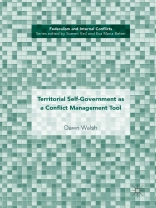This book provides an in-depth narrative of the difficulties facing Territorial Self-Government institutions across Northern Ireland, Bosnia, the former Yugoslav Republic of Macedonia, Moldova, and Iraq. It brings together analyses of both prominent and lesser known cases to provide a broad overview of how Territorial Self-Government operates as a conflict management tool in different contexts. Drawing on lessons from these five cases, the author demonstrates the importance of designing and implementing international guarantees to self-government and the associated difficulties. Domestic capacity development must be encouraged and international actors needs to balance the guarantees aimed at providing stability with their wider security and economic concerns. The volume also strongly connects to broader research and theory on conflict management, particularly the role of institutional design and international assistance.
İçerik tablosu
Introduction: Guaranteeing territorial self-government as a conflict
management tool.- Northern Ireland: Autonomy as a conflict management
tool in a stable state, ethnonational guarantors, and low-level international
assistance.- Bosnia and Herzegovina: Ethnic entities in a multi-ethnic state?
Instability and disputed interpretations of the state.- Macedonia: Enhanced
local government and ethnic conflict.- Moldova: Weak autonomy, central
government neglect, and mixed international impact.- Iraq: Iraqi Kurdistan,
unresolved issues, and changing international priorities.- Conclusion.
Yazar hakkında
Dawn Walsh is Irish Research Council-Marie Curie Elevate Research Fellow at Dublin City University, Ireland. Her research interests include the creation of innovative institutions to manage conflict, the implementation of peace agreements, gender and peace processes, and the role on international actors in facilitating peace agreements.












